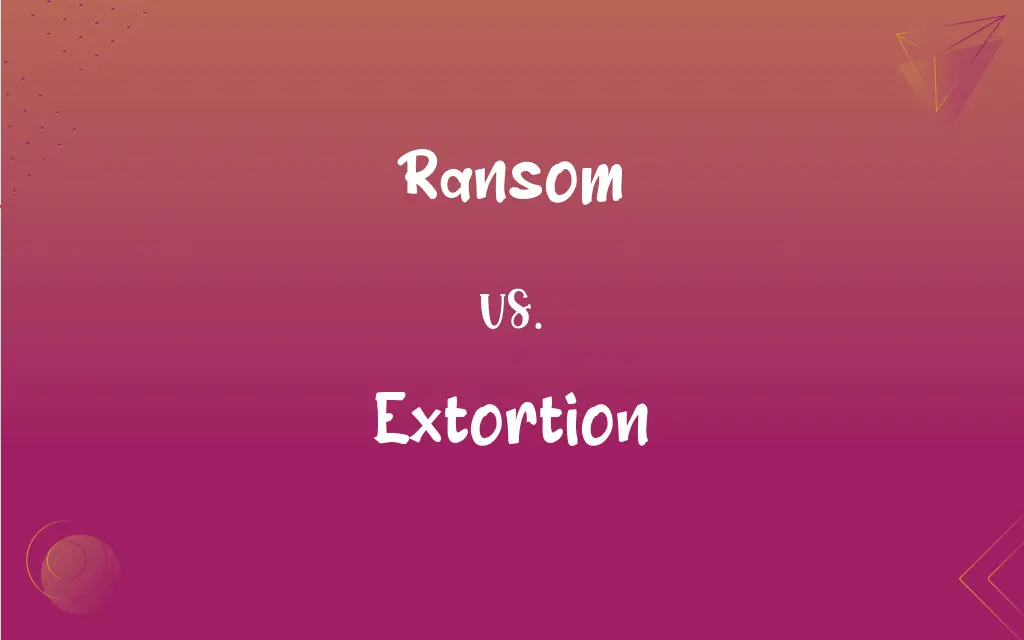Ransom vs. Extortion: What's the Difference?
Edited by Harlon Moss || By Janet White || Updated on October 2, 2023
Ransom refers to the money or payment demanded for the release of a captive or return of stolen property. Extortion is the act of obtaining money, goods, or services through coercion, threats, or intimidation.

Key Differences
Ransom is the sum of money or other valuables demanded or paid to secure the release of a person, property, or information. Extortion is a broader term, encompassing the act of forcing someone to give up money, goods, or some advantage under duress, often involving threats or intimidation. In essence, ransom is a subset of extortion but is specific to scenarios involving kidnapping or theft.
Grammatically, both ransom and extortion are primarily used as nouns in American English. While "extortion" has a corresponding verb form, "to extort," the word "ransom" is both a noun and a verb, with the verb form meaning "to hold for ransom." In their respective plurals, "ransoms" refers to multiple instances of ransom, and "extortions" indicates multiple acts of coercion for financial gain.
While ransom payments are typically made to secure the release of a person or item from captivity, extortion covers a wider range of coercive practices. This could involve blackmail, where payment is demanded to keep compromising information secret. Extortion could also involve threats to property or even threats of violence. Ransom is generally a one-time payment, while extortion can be ongoing, particularly if it involves a situation like protection rackets or regular demands for money.
Ransom often implies an illegal detainment or the taking of hostages and is a criminal act in virtually all jurisdictions. Extortion, too, is a criminal act but may not always involve illegal detainment or kidnapping. For example, extortion can take place over the phone or via email, where threats are made but no one is physically detained. Both acts are illegal and punishable by law, but their contexts and methods can be quite different.
Comparison Chart
Definition
Payment for release of captive or property
Coercion to obtain money, goods, or service
ADVERTISEMENT
Legality
Illegal
Illegal
Part of Speech
Noun and verb
Noun, verb ("to extort")
Plural Form
Ransoms
Extortions
Scope
Specific to kidnapping/theft
Broader, includes various coerci
Ransom and Extortion Definitions
Ransom
Payment to recover stolen property.
They paid a ransom to get their stolen art back.
ADVERTISEMENT
Extortion
Forcing compliance for advantage.
The corrupt official was found guilty of extortion.
Ransom
Financial demand in a kidnapping.
The ransom note was left on the doorstep.
Extortion
Unlawful demands with menaces.
Extortion by threatening to release personal information is common.
Ransom
Money for release of a captive.
The kidnappers demanded a $1 million ransom.
Extortion
Threats for financial gain.
He was arrested for extortion after blackmailing his boss.
Ransom
Fee for safe retrieval.
The company paid a ransom to unlock their data.
Extortion
Unjust exaction of resources.
Extortionate rent hikes forced tenants to move out.
Ransom
The release of property or a person in return for payment of a demanded price.
Extortion
Coercion for money or goods.
The mob was involved in extortion schemes.
Ransom
The price or payment demanded or paid for such release.
Extortion
Illegal use of one's official position or powers to obtain property, funds, or patronage.
Ransom
(Christianity) A redemption from sin and its consequences.
Extortion
The act or an instance of extorting something, as by psychological pressure.
Ransom
To obtain the release of by paying a certain price.
Extortion
An excessive or exorbitant charge.
Ransom
To release after receiving such a payment.
Extortion
The practice of extorting money or other property by the use of force or threats.
Ransom
(Christianity) To deliver from sin and its consequences.
Extortion
The act of extorting; the act or practice of wresting anything from a person by force, by threats, or by any undue exercise of power; undue exaction; overcharge.
Ransom
Money paid for the freeing of a hostage.
They were held for two million dollars ransom.
They were held to ransom.
Extortion
The offense committed by an officer who corruptly claims and takes, as his fee, money, or other thing of value, that is not due, or more than is due, or before it is due.
Ransom
The release of a captive, or of captured property, by payment of a consideration.
Prisoners hopeless of ransom
Extortion
That which is extorted or exacted by force.
Ransom
A sum paid for the pardon of some great offence and the discharge of the offender; also, a fine paid in lieu of corporal punishment.
Extortion
An exorbitant charge
Ransom
(obsolete) To deliver, especially in context of sin or relevant penalties.
Extortion
Unjust exaction (as by the misuse of authority);
The extortion by dishonest officials of fees for performing their sworn duty
Ransom
To pay a price to set someone free from captivity or punishment.
To ransom prisoners from an enemy
Extortion
The felonious act of extorting money (as by threats of violence)
Ransom
To exact a ransom (payment) in exchange for the freedom of.
Ransom
The release of a captive, or of captured property, by payment of a consideration; redemption; as, prisoners hopeless of ransom.
Ransom
The money or price paid for the redemption of a prisoner, or for goods captured by an enemy; payment for freedom from restraint, penalty, or forfeit.
Thy ransom paid, which man from death redeems.
His captivity in Austria, and the heavy ransom he paid for his liberty.
Ransom
A sum paid for the pardon of some great offense and the discharge of the offender; also, a fine paid in lieu of corporal punishment.
Ransom
To redeem from captivity, servitude, punishment, or forfeit, by paying a price; to buy out of servitude or penalty; to rescue; to deliver; as, to ransom prisoners from an enemy.
Ransom
To exact a ransom for, or a payment on.
Such lands as he had rule of he ransomed them so grievously, and would tax the men two or three times in a year.
Ransom
Money demanded for the return of a captured person
Ransom
Payment for the release of someone
Ransom
The act of freeing from captivity or punishment
Ransom
Exchange or buy back for money; under threat
Ransom
Monetary condition for freedom.
The pirates set a ransom for the captured sailors.
FAQs
Is Ransom always illegal?
Ransom is generally illegal, as it involves unlawful detainment or theft.
Is Extortion always illegal?
Extortion is illegal because it involves coercion and threats for gain.
How do Ransom and Extortion differ?
Ransom is a subset of extortion, specific to kidnappings or thefts.
What is Ransom?
Ransom is the payment demanded for the release of a captive or return of stolen property.
What is the verb form of Extortion?
The verb form of extortion is "to extort."
What is Extortion?
Extortion is obtaining money, goods, or services through coercion, threats, or intimidation.
Is Ransom a form of Extortion?
Yes, ransom can be considered a specific type of extortion.
Can Extortion occur online?
Yes, extortion can occur online, often as "cyber-extortion."
Is the act of paying a Ransom illegal?
Paying a ransom may not be illegal, but it is generally discouraged by authorities.
Can Extortion involve physical threats?
Yes, extortion can involve threats of physical harm.
Is Ransom only about money?
Ransom usually involves money, but can also involve other forms of payment.
Who are typical targets of Ransom?
Kidnapping victims, companies facing data breaches, and stolen property owners can be targets.
What are the plurals of Ransom and Extortion?
The plurals are "ransoms" and "extortions."
Can Ransom also be a verb?
Yes, "to ransom" means to hold someone or something for ransom.
Who are typical targets of Extortion?
Businesses, public figures, and ordinary individuals can be targets of extortion.
About Author
Written by
Janet WhiteJanet White has been an esteemed writer and blogger for Difference Wiki. Holding a Master's degree in Science and Medical Journalism from the prestigious Boston University, she has consistently demonstrated her expertise and passion for her field. When she's not immersed in her work, Janet relishes her time exercising, delving into a good book, and cherishing moments with friends and family.
Edited by
Harlon MossHarlon is a seasoned quality moderator and accomplished content writer for Difference Wiki. An alumnus of the prestigious University of California, he earned his degree in Computer Science. Leveraging his academic background, Harlon brings a meticulous and informed perspective to his work, ensuring content accuracy and excellence.






































































